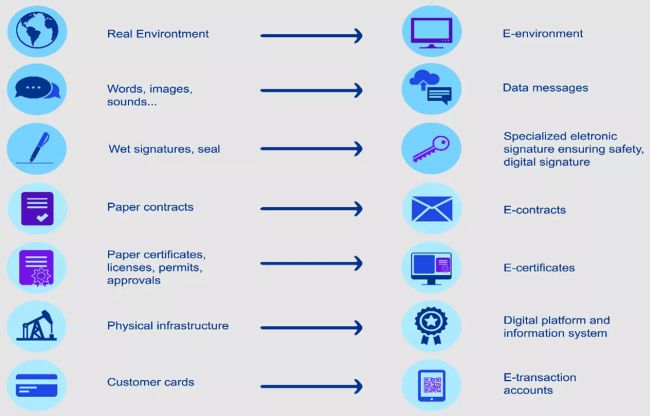Introduction
In line with the sustainable development goal of the United Nations,1 in 2020, the Government of Vietnam approved the National Digital Transformation Program to 2025, with vision to 2030 (NDTP 2020). The program's goal is to make Vietnam a digital, stable, and prosperous country that leads in innovation and adoption of new technologies and models, revolutionizes the Government's management and administration, the enterprises' production and business, and the people's living and working standards, and establish a safe, humane, and universal digital environment by 2030.
The amended law on E-transactions was passed by the National Assembly of Vietnam on 22 June 2023 (LoET 2023). Inspired by the Model Law on E-Commerce of the United Nations Commission on International Trade Law (UNCITRAL),2 the LoET 2023 strives to fully represent the real-life transactions in the e-environment and boost Vietnam's economy to quickly keep pace with the modern technological innovations of the world.
The LoET 2023 inherits the success of the previous version of the law, that set the basis for e-transactions and includes additional new traits on the scope of application, complete e-transaction definition, e-contract performance, national digital platform role, and data sharing, online supervision, and inspection policies. These features are summarized in this article as follows:
1. Extended scope of transaction on e-environment
Institutions and technology are two crucial pillars for digital transformation. To facilitate this process, the Government will establish institutions and policies that are open to experimentation and innovation in a controlled environment. This includes regulations on standardization and electronic processing of records on e-environment; increased use of e-documents and e-reports embedded with digital signatures between State management agencies, socio-political organizations and enterprises; and the digitization and archiving of e-records in accordance with the regulations.3
In accordance with the rule, the LoET 2023 stipulates that transactions must be conducted electronically, including their content, conditions, and form. It also removes restrictions and exclusions from the LoET 2005, allowing for the application of e-transactions in all areas of socio-economic life.4 Key areas of social impacts include health, education, finance - banking, agriculture, transport and logistics, energy, natural resources and environment, industrial production.5 This is similar to the applicable laws of developed countries such as the European Union, the Commonwealth, and Singapore.6
Furthermore, the LoET 2023 can enhance or facilitate a wide range of prevailing laws to take immediate effect in the e-environment. Any law that has not previously provided for electronic transactions is now permitted to apply the provisions of the LoET 2023.7 Additionally, since the LoET 2023 mandates that e-transactions have equivalent value to and can replace traditional transactions,8 State and non-State agencies and organizations cannot refuse the legal value of e-transactions due to the absence of regulations. This is significant and has far reaching impact in being able to create empowering provisions for recognition and the usage of e-transactions.
2. Complete e-transaction - Recognition of legal validity of components constituting e-transactions
The LoET 2023 recognizes the legal validity of the fundamental elements of an e-transaction to ensure its legitimacy. These elements include the e-environment, data messages, specialized e- signatures ensuring safety, digital signatures, e-contracts, e-certificates, information systems, digital platforms for e-transactions, and e-transaction accounts. The image below illustrates the comparative components of transactions in both the real and e-environment.

Source: Magazine of Information and Communications9
Complete e-transactions optimize processing time and costs, facilitate State administrative management, and improve business performance. They also provide a crucial legal basis for overcoming the challenges posed by complex, expensive e-transactions that currently exist in both paper and electronic forms, slowing down the digital transformation process.
Additionally, the LoET 2023 facilitates the smooth and barrier-free conversion between paper and electronic documents and provides safety regulations for this process.10 Notably, for the first time, the LoET 2023 introduces trust services11 along with e-certificates12 to establish trust in and strengthen e-transactions, affirming the legal validity of licenses, diplomas, certificates, and approvals. This helps to address the major challenge of implementing complete online public services when the results of administrative procedures are returned electronically.
Furthermore, the LoET 2023 includes regulations on the recognition of foreign e-signature certification service providers, as well as the recognition of foreign e-signatures and e-signature certificates.13 This provision reduces cross-border transaction costs for organizations and individuals and promotes cross border e-transactions. However, these regulations are currently pending the implementation guidance from the Ministry of Information and Communications (MIC) being the agency responsible for managing e-transactions on behalf of the Government.
3. Removal of difficulties and obstacles in e-contracts implementation
The implementation of e-contracts in industries such as labor and transportation face numerous challenges and legal barriers. This is due to the absence of regulations that allow competent authorities to oversee the conclusion of such contracts. The finance and banking sectors are particularly affected by these issues, as they require swift adaptation to the rapidly evolving landscape of e-transactions worldwide.
To address this issue, the LoET 2023 has removed the barriers or administrative difficulties, by granting Ministers of various Ministries the authority to promulgate regulations on e-contracts within their respective areas of competence. For example, the Ministry of Labor, War Invalids and Social Affairs may issue a Circular on electronic labor contracts while the Ministry of Culture, Sports and Tourism may issue a Circular on electronic travel contracts.
The LoET 2023 plays a particularly important role as a legal framework for banking and finance sector in e-transactions, promoting digital transformation and enhancing the efficiency and security of transactions. This is achieved by allowing (i) the contracting parties to use data messages and electronic means to conduct part or all of a transaction during the conclusion and performance of e-contracts;14 (ii) the parties the right to agree on relevant technical requirements, integrity and confidentiality assurance conditions in accordance with the provisions of the LoET 2023 and other relevant laws;15 and (iii) all notices in the conclusion and performance of e-contracts are guaranteed to have legal validity.16
4. Legalization over the role of national digital platforms
National digital platforms were first mentioned in the NDTP 2020 digital platform development strategies17 and were later institutionalized in the LoET 2023. The definition of a digital platform is based on an information system designed for e-transactions. Specifically, an information system for e-transactions is a collection of hardware, software, and database with key functions and features to facilitate e-transactions while ensuring their authenticity and trustworthiness.18
Digital platforms are categorized into two types i.e., digital platforms and intermediary digital platforms served for e-transactions:
- Digital platforms served for e-transactions is a system that allows the parties to conduct transactions or provide and use products or services or develop products and services.
- Intermediary digital platforms served for e-transactions is a digital platform where the owner is independent of the parties performing the transaction.
The LoET 2023 outlines the legal responsibilities of owners of information systems that facilitate e-transactions. These responsibilities include granting and managing e-transaction accounts, complying with the LoET 2023, and regulations on network information safety, network security, protection of personal data, as well as fulfilling obligations to publish mechanisms for reporting and addressing illegal content on digital platforms.20 The obligations increase in accordance with the scale of the information system's services. This regulation is similar to the European Union's package of e-services regulations, including the Digital Services Act and Digital Markets Act, which aim to create a safer digital space where users' fundamental rights are protected and to establish a level playing field for businesses.21
5. Policy on data sharing, online supervision, monitoring, and inspection
The LoET 2023 establishes a significant foundation for State management in the use of big data, particularly in the areas of data sharing and monitoring information infrastructures for e-transactions. Specifically, State agencies are responsible for ensuring their readiness to connect and share data with agencies, organizations, and individuals involved in e-transactions, as well as other agencies and organizations. They are prohibited from providing data in paper form for information that has already been accessed through the connection and sharing of information systems, and from charging fees for data sharing between government agencies.22
In addition to the above, State agencies are required to use online data connection and sharing methods between the information systems of data providing and data exploiting agencies, except for information related to State secrets or national defense and security.23 Furthermore, State agencies are obligated to share open data with agencies, organizations, and individuals for free use, reuse, and further sharing.24
Supervision and inspection activities are prioritized to be carried out entirely in an e-environment, along with other State activities such as the provision of public services, internal administration, State direction and management.25
6. Conclusion
The LoET 2023 outlines the principles for conducting transactions electronically, applicable to both domestic and foreign organizations and individuals directly involved in or related to e-transactions. This provides a legal foundation for a thriving e-market while ensuring user safety and facilitating State management. As such, the LoET 2023 can be considered a fundamental law on digital transformation. It is hoped that the effectiveness of the LoET 2023, along with its guiding legal documents to be issued by the Government and the Ministry of Information and Communications by mid-2024, will provide a complete legal framework for the transition from physical to digital activities across all industries in Vietnam.
Footnotes
1. See more at United Nations Sustainable Development Goals
2. See more at UNCITAD Electronic Commerce
3. NDTP 2030
4. Article 1.1 and Article 1.2 LoET 2023
5. NDTP 2030
6. See more at Vietnam's E-transaction Law: Some implications from international experience
7. Article 1.3 LoET 2023
8. Article 8 – Article 11 LoET 2023
9. See more at Luật Giao dịch điện tử (sửa đổi): khơi thông điểm nghẽn và tạo thuận lợi cho CĐS
10. Article 12 LoET 2023
11. Article 28 LoET 2023
12. Article 19 LoET 2023
13. Article 26.1 LoET 2023
14. Article 36.1 LoET 2023
15. Article 36.2 LoET 2023
16. Article 38 LoET 2023
17. The digital platforms prioritized for development include national electronic identification and authentication system, an electronic payment system, cloud computing technology, and digital platforms that can be widely deployed in various fields such as e-commerce, agriculture, tourism, health, education, transportation, construction, resources and environment, online learning, digital content, accounting services, corporate finance, urban planning, and digital banking.
18. Article 45.1 LoET 2023
10. Article 45.2 and Article 45.3 LoET 2023
20. Article 47 LoET 2023
21. See more at The Digital Services Act package
22. Article 42.1 LoET 2023
23. Article 42.3 LoET 2023
24. Article 43 LoET 2023
25. Article 44.2 LoET 2023
Originally published 28 September 2023
The content of this article is intended to provide a general guide to the subject matter. Specialist advice should be sought about your specific circumstances.

